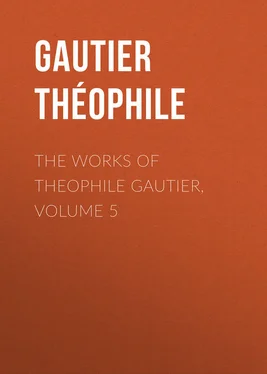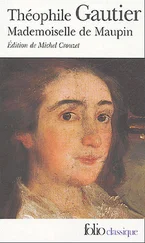Théophile Gautier - The Works of Theophile Gautier, Volume 5
Здесь есть возможность читать онлайн «Théophile Gautier - The Works of Theophile Gautier, Volume 5» — ознакомительный отрывок электронной книги совершенно бесплатно, а после прочтения отрывка купить полную версию. В некоторых случаях можно слушать аудио, скачать через торрент в формате fb2 и присутствует краткое содержание. Жанр: foreign_antique, foreign_prose, на английском языке. Описание произведения, (предисловие) а так же отзывы посетителей доступны на портале библиотеки ЛибКат.
- Название:The Works of Theophile Gautier, Volume 5
- Автор:
- Жанр:
- Год:неизвестен
- ISBN:нет данных
- Рейтинг книги:3 / 5. Голосов: 1
-
Избранное:Добавить в избранное
- Отзывы:
-
Ваша оценка:
- 60
- 1
- 2
- 3
- 4
- 5
The Works of Theophile Gautier, Volume 5: краткое содержание, описание и аннотация
Предлагаем к чтению аннотацию, описание, краткое содержание или предисловие (зависит от того, что написал сам автор книги «The Works of Theophile Gautier, Volume 5»). Если вы не нашли необходимую информацию о книге — напишите в комментариях, мы постараемся отыскать её.
The Works of Theophile Gautier, Volume 5 — читать онлайн ознакомительный отрывок
Ниже представлен текст книги, разбитый по страницам. Система сохранения места последней прочитанной страницы, позволяет с удобством читать онлайн бесплатно книгу «The Works of Theophile Gautier, Volume 5», без необходимости каждый раз заново искать на чём Вы остановились. Поставьте закладку, и сможете в любой момент перейти на страницу, на которой закончили чтение.
Интервал:
Закладка:
Eight or ten men hung on to the rope, the end of which was let fall into the well. With the agility of a monkey or of an athlete, Argyropoulos caught hold of the swinging rope and let himself down some fifteen feet, holding on with his hands and striking with his heels the walls of the well. Wherever he struck the rock it gave out a dead, dull sound. Then Argyropoulos let himself fall to the bottom of the well and struck the ground with the hilt of his kandjar, but the compact rock did not resound. Lord Evandale and the doctor, burning with eager curiosity, bent over the edge at the risk of falling in headlong, and watched with intense interest the search undertaken by the Greek.
"Hold hard!" cried he at last, annoyed at finding nothing; and he seized the rope with his two hands to ascend.
The shadow of Argyropoulos, lighted from below by the torch which was still burning at the bottom of the well, was projected against the ceiling and cast on it a silhouette like that of a monstrous bird. His sunburned face expressed the liveliest disappointment, and under his moustache he was biting his lips.
"There is not a trace of a passage!" he cried; "and yet the excavation cannot stop here."
"Unless," said Rumphius, "the Egyptian who ordered this tomb died in some distant nome, on a voyage, or in battle, the work being then abandoned, as is known to have been the case occasionally."
"Let us hope that by dint of searching we shall find some secret issue," returned Lord Evandale; "otherwise we shall try to drive a transverse shaft through the mountain."
"Those confounded Egyptians were clever indeed at concealing the entrances to their tombs, – always trying to find out some way of putting poor people off the track. One would think that they laughed in anticipation at the disappointment of searchers," grumbled Argyropoulos. Drawing to the edge of the well, the Greek cast a glance, as piercing as that of a night-bird, upon the wall of the little chamber which formed the upper portion of the well. He saw nothing but the ordinary characters of psychostasia, – Osiris the judge seated on his throne in the regulation attitude, holding the crook in the one hand, the whip in the other, and the goddesses of Justice and Truth leading the spirit of the dead to the tribunal of Amenti. Suddenly he seemed to be struck with a new idea, and turned sharply around. His long experience as an excavator recalled to him a somewhat analogous case. In addition, the desire of earning the thousand guineas of his lordship spurred up his faculties. He took a pick-axe from the hands of a fellah, and began, walking backward, to strike sharply right and left on the surface of the rock, often at the risk of damaging some of the hieroglyphs or of breaking the beak or the wing-sheath of the sacred hawk or the scarabæus.
The wall, thus questioned, at last answered the hammer and sounded hollow. An exclamation of triumph broke from the Greek and his eyes flashed; the doctor and the nobleman clapped their hands.
"Dig here," said Argyropoulos, who had recovered his coolness, to his men.
An opening large enough to allow a man to pass through was made. A gallery running within the mountain around the obstacle which the well offered to the profane, led to a square hall, the blue vault of which rested upon four massive pillars ornamented by the red-skinned, white-garmented figures which so often show, in Egyptian frescoes, the full bust and the head in profile. This hall opened into another, the vault of which was somewhat higher and supported by two pillars only. Various scenes – the mystic bark, the bull Apis bearing the mummy towards the regions of the West, the judgment of the soul and the weighing of the deeds of the dead in the supreme scales, the offerings to the funeral divinities – adorned the pillars and the hall. They were carved in flat, low relief with sharp outline, but the painter's brush had not completed the work of the chisel. By the care and delicacy of the work might be judged the importance of the personage whose tomb it had been sought to conceal from the knowledge of men.
After having spent a few moments in examining these carvings, which were in the purest manner of the fine Egyptian style of the classical age, the explorers perceived that there was no issue from the hall, and that they had reached a sort of blind place. The air was becoming somewhat rarified, the torches burned with difficulty and further augmented the heat of the atmosphere, while the smoke formed a dense pall. The Greek gave himself to the devil, but that did no good. Again the walls were sounded without any result. The mountain, thick and compact, gave back but a dead sound; there was no trace of a door, of a passage, or of any sort of opening.
The young nobleman was plainly discouraged, and the doctor let fall his arms by his side. Argyropoulos, who feared losing his thousand guineas, exhibited the fiercest despair. However, the party was compelled to retreat, for the heat had become absolutely suffocating.
They returned to the outer hall, and there the Greek, who could not make up his mind to see his golden dream vanish in smoke, examined with the most minute attention the shafts of the pillars to make certain that they did not conceal some artifice, that they did not mask some trap which might be discovered by displacing them; for in his despair he mingled the realism of Egyptian architecture with the chimerical constructions of the Arab tales. The pillars, cut out of the mountain itself, in the centre of the hollowed mass, formed part of it, and it would have been necessary to employ gunpowder to break them down. All hope was gone.
"Nevertheless," said Rumphius, "this labyrinth was not dug for nothing. Somewhere or another there must be a passage like the one which goes around the well. No doubt the dead man was afraid of being disturbed by importunate persons and he had himself carefully concealed; but with patience and perseverance you can get anywhere. Perhaps a slab carefully concealed, the joint of which cannot be seen, owing to the dust scattered over the ground, covers some descent which leads, directly or indirectly, to the funeral hall."
"You are right, doctor," said Evandale; "those accursed Egyptians jointed stones as closely as the hinges of an English trap. Let us go on looking."
The doctor's idea struck the Greek as sound, and he made his fellahs walk about every part and corner of the hall, tapping the ground. At last, not far from the third pillar a dull resonance struck on the practised ear of the Greek. He threw himself on his knees to examine the spot, brushing away with the ragged burnouse one of his Arabs had thrown him the impalpable dust of thirty-five centuries. A black, narrow, sharp line showed, and, carefully followed out, marked out on the ground an oblong slab.
"Did I not tell you," cried the enthusiastic doctor, "that the passage could not end in this way?"
"I am really troubled," said Lord Evandale, in his quaint, phlegmatic British fashion, "at disturbing the last sleep of the poor unknown body which did expect to rest in peace until the end of the world. The dweller below would willingly dispense with our visit."
"The more so that a third party is lacking to make the presentation formal," replied the doctor. "But do not be anxious, my lord, I have lived long enough in the days of the Pharaohs to present you to the illustrious personage who inhabits this subterranean passage."
Crow-bars were applied to the narrow fissure, and after a short time the stone moved and was raised. A staircase with high, steep steps, sinking into darkness, awaited the impatient travellers, who rushed down pell-mell. A sloping gallery painted on both walls with figures and hieroglyphs came next, then at the end of the gallery some more steps leading to a short corridor, a sort of vestibule to a hall in the same style as the first one, but larger and upborne by six pillars cut out of the living rock. The ornamentation was richer, and the usual motives of funeral paintings were multiplied on a yellow background. To the right and to the left opened in the rock two small crypts or chambers filled with funeral statuettes of enamelled ware, bronze, and sycamore wood.
Читать дальшеИнтервал:
Закладка:
Похожие книги на «The Works of Theophile Gautier, Volume 5»
Представляем Вашему вниманию похожие книги на «The Works of Theophile Gautier, Volume 5» списком для выбора. Мы отобрали схожую по названию и смыслу литературу в надежде предоставить читателям больше вариантов отыскать новые, интересные, ещё непрочитанные произведения.
Обсуждение, отзывы о книге «The Works of Theophile Gautier, Volume 5» и просто собственные мнения читателей. Оставьте ваши комментарии, напишите, что Вы думаете о произведении, его смысле или главных героях. Укажите что конкретно понравилось, а что нет, и почему Вы так считаете.












